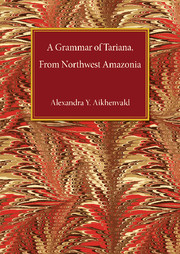Book contents
- Frontmatter
- Dedication
- Contents
- List of tables, schemes and diagrams
- Preface
- Acknowledgements
- Organisation and cross-referencing
- List of abbreviations
- Map
- 1 The language and its speakers
- 2 Phonology
- 3 Word classes
- 4 Nominal morphology and noun structure
- 5 Noun classes and classifiers
- 6 Possession
- 7 Case marking and grammatical relations
- 8 Number
- 9 Further nominal categories
- 10 Derivation and compounding
- 11 Closed word classes
- 12 Verb classes and predicate structure
- 13 Valency changing and argument rearranging mechanisms
- 14 Tense and evidentiality
- 15 Aspect, Aktionsart and degree
- 16 Mood and modality
- 17 Negation
- 18 Serial verb constructions and verb compounding
- 19 Complex predicates
- 20 Participles and nominalisations
- 21 Clause types and other syntactic issues
- 22 Subordinate clauses and clause linking
- 23 Relative clauses
- 24 Complement clauses
- 25 Discourse organisation
- 26 Issues in etymology and semantics
- Appendix. The main features of the Tariana dialects
- Texts
- Vocabulary
- References
- Index of authors, languages and subjects
20 - Participles and nominalisations
Published online by Cambridge University Press: 05 August 2013
- Frontmatter
- Dedication
- Contents
- List of tables, schemes and diagrams
- Preface
- Acknowledgements
- Organisation and cross-referencing
- List of abbreviations
- Map
- 1 The language and its speakers
- 2 Phonology
- 3 Word classes
- 4 Nominal morphology and noun structure
- 5 Noun classes and classifiers
- 6 Possession
- 7 Case marking and grammatical relations
- 8 Number
- 9 Further nominal categories
- 10 Derivation and compounding
- 11 Closed word classes
- 12 Verb classes and predicate structure
- 13 Valency changing and argument rearranging mechanisms
- 14 Tense and evidentiality
- 15 Aspect, Aktionsart and degree
- 16 Mood and modality
- 17 Negation
- 18 Serial verb constructions and verb compounding
- 19 Complex predicates
- 20 Participles and nominalisations
- 21 Clause types and other syntactic issues
- 22 Subordinate clauses and clause linking
- 23 Relative clauses
- 24 Complement clauses
- 25 Discourse organisation
- 26 Issues in etymology and semantics
- Appendix. The main features of the Tariana dialects
- Texts
- Vocabulary
- References
- Index of authors, languages and subjects
Summary
Tariana has a number of fully productive deverbal nominais. They include participles, or relative verb forms, whose main function is to mark relative clauses, see §20.1 and Chapter 23, and converbs and nominalisations, discussed in §20.2. Nominalisations constitute a subclass of nominais which differ from others in that they do not take the indefinite possessor marker i- (see Chapters 3 and 6). All nominalisations are characterised by affix sharing, as discussed in §18.2, whereby the marker of the nominalisation applies just once per serial verb. Nominalisations cannot be derived from complex predicates (with a possible exception of passive participles: see §20.1). Aktionsart enclitics always occur outside nominalisations, e.g. na-sita-nipe dhuli (3pl-shoot-NOM SLIDE) ‘their shooting with a sliding motion’, ka-whã-ka-ɾi hotho (REL-bite-PAST.REL.MASC.SG THROUGH) ‘the one who bit right through’ and so on.
In §20.3 we discuss the role of classifiers in their derivational function, and the topic-advancing voice as a derivational strategy.
Participles
Participles mark the predicate of a relative clause (see Chapter 23), and are often translated as agent nominalisations. They are derived from prefixed verbs with the prefix ka- ‘relative’ – whose negative counterpart is ma- ‘negative’ – and distinguish three tenses, with number and gender within them. See Table 9.2.
Two genders and plural number are distinguished only in past participles; e.g. ka-swa (REL-lie) ‘the one who is lying down’, ka-swa-ka-ɾi (REL-lie-PAST.REL-MASC.SG) ‘the man who was lying down’, ka-swa-ka-ɾu (REL-lie-PAST.REL-FEM.SG) ‘the woman who was lying down’, ka-swa-ka-ni (REL-lie-PAST.REL-PL) ‘those who were lying down’, ka-swa-pena (REL-lie-FUT.PART) ‘the one to lie down’.
- Type
- Chapter
- Information
- A Grammar of Tariana, from Northwest Amazonia , pp. 460 - 474Publisher: Cambridge University PressPrint publication year: 2003



